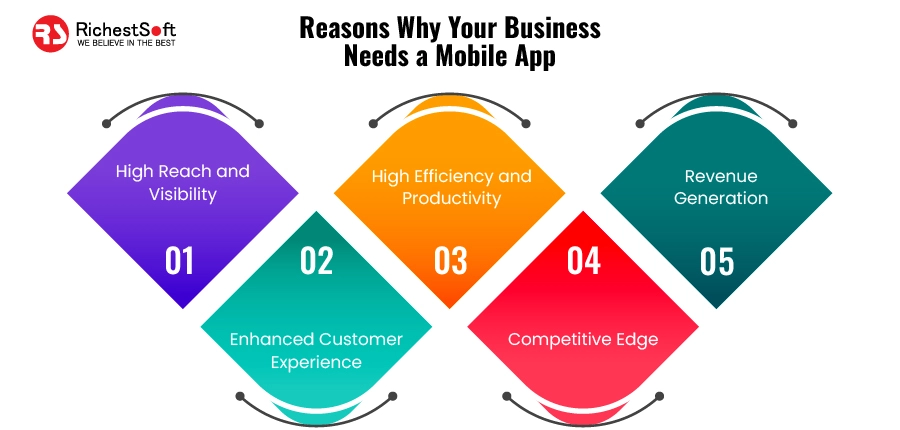Mobile app development has become an essential part of the small business world. With the increasing usage of smartphones, Tablets and the internet, mobile apps allow small businesses to reach more customers and enhance their overall business processes. Yet, many small business owners are threatened by the app development process and usually think it must be simplified or cheaper for them. Developing a mobile app for your small business can be reasonably straightforward and inexpensive and can guide you to significant benefits.
According to Statista, mobile apps are projected to generate $613 billion in revenue by 2025, showing a significant opportunity for small businesses to capitalise on this trend. Also, a survey by Clutch indicated that 42% of small businesses now have a mobile app, while another 30% plan to develop one.
In this blog, we will introduce mobile app development for small businesses. We will cover the advantages of mobile apps, the app development process, and how to select a developer. Whether you are a small business owner looking to develop your first mobile app or simply curious, this blog will guide helpful insights into mobile app development for small businesses.
Why Do We Need to Develop a Mobile App?
Smartphones are now necessary for communication, entertainment, and other purposes, from business to education. Mobile devices have revolutionised the way we live and work. Mobile apps are now more necessary than ever due to smartphones and tablets rising in popularity.
Here are some reasons we should create mobile apps and how they can help people and companies.
✅ High Reach and Visibility:
Businesses can significantly increase their reach and visibility by developing a mobile app. A mobile app lets them quickly connect with their customers, regardless of location. Moreover, mobile apps provide a platform for Companies to showcase their products and services, allowing customers to find and engage with them more easily.
✅ Enhanced Customer Experience:
A mobile app can enhance the overall customer experience by providing a seamless and personalised experience. With the help of mobile apps, businesses can offer customised services, such as personalised recommendations and offers, based on customer preferences and behaviour. This can help companies to build long-term relationships with their customers and increase customer loyalty.
✅ High Efficiency and Productivity:
Businesses can also benefit from mobile apps regarding efficiency and productivity. Companies save time and increase efficiency by automating routine activities, such as invoicing, inventory management, and customer service. In addition to improving productivity, mobile apps can allow employees to access important information and communicate with colleagues even when they are on the move.
✅ Competitive Edge:
Developing a mobile app can give businesses a competitive edge. By offering a mobile app, companies can differentiate themselves from their competitors and provide a unique value proposition to their customers. Moreover, mobile apps can help businesses to stay ahead of the turn and adapt to varying market trends and customer preferences.
✅ Revenue Generation:
Mobile apps can also help businesses to generate revenue. Companies can monetise their mobile apps and generate a new income stream by offering in-app buy-sell purchases, advertising and subscriptions. Moreover, mobile apps can help businesses boost their sales by making it more comfortable for customers to make purchases and offering targeted promotions.
Developing a mobile app has become necessary in today’s digital era. It can help businesses to boost their reach and visibility, improve customer experience, improve efficiency and productivity, gain a competitive edge, and generate revenue. Therefore, companies should consider developing a mobile app as a part of their overall digital marketing strategy to stay ahead of the curve and meet the evolving demands of their customers.
Framework Used by Small Businesses to Develop Mobile Apps.
Mobile app development has become essential to business growth, allowing businesses to engage customers and facilitate their operations. One of the critical aspects of developing a successful mobile app is selecting the proper framework. Here, we will discuss small businesses’ top 5 mobile frameworks for creating mobile apps.

1. React Native
React Native is a popular framework for creating mobile apps for iOS and Android platforms. It is an open-source framework widely used in the app development community due to its simplicity, flexibility and reused code. React Native uses a JavaScript-based language, making it easy to understand for developers with knowledge of app development. It also delivers access to native components and APIs, allowing app developers to create native-like apps.
Popular Mobile Apps Based On React Native framework:- Facebook, Airbnb, Instagram
2. Flutter
Flutter is a trending mobile app development framework developed by Google. It uses Dart’s programming language, allowing developers to write code once and deploy it on iOS and Android platforms. Flutter is known for its fast development speed, expressive design, and flexible widgets. It also provides rich features, such as gesture recognition, animation, and hot reload, making it easier for developers to build visually appealing and interactive mobile apps.
Popular Mobile App Based On Flutter framework:- Google Ads, Alibaba
3. Ionic
Ionic is a mobile app development framework that uses web technologies such as HTML, CSS, and JavaScript to develop cross-platform apps for iOS and Android platforms. It provides access to a rich set of components and plugins, making it more straightforward for developers to create visually appealing and interactive mobile apps. Ionic also offers a wide range of tools, plugins and services, such as the Ionic Appflow, simplifying mobile app development.
Popular Mobile App Based On Ionic framework:- Pacifica and Sworkit
4. Xamarin
Xamarin is a mobile app development framework owned by Microsoft. It uses a programming language called C#, allowing app developers to build native-like apps for iOS and Android platforms. Xamarin delivers access to native APIs and features, enabling developers to create high-performance mobile apps. It also offers many tools and plugins to simplify the app development process.
Popular Mobile App Based On Xamarin framework:- Storyo and FreshDirect
5. PhoneGap
PhoneGap is an open-source framework allowing developers to develop cross-platform mobile apps using web technologies such as HTML, CSS, and JavaScript. It provides access to native device features through a JavaScript API, making it more comfortable for developers to create native-like apps. PhoneGap also offers many tools and services, such as the PhoneGap Build, which simplifying mobile app development.
Popular Mobile App Based On PhoneGap framework:- TripCase and Untappd
Types of Mobile Apps for Small Businesses

Mobile apps have become a universal part of our daily lives. From checking the weather forecast to ordering food, there’s an app for almost everything. But did you understand that there are different types of mobile apps? Here are some types of mobile apps and their characteristics.
✅ Native Apps
Native apps are developed specifically for a mobile operating system like iOS or Android. These apps are built using the programming language and tools provided by the OS developer. Native apps give the best performance, user experience, and access to device features like camera, GPS, and contacts.
Examples: Instagram, Facebook, Snapchat
✅ Hybrid Apps
Hybrid apps combine native and web apps. These apps are built using web technologies like HTML, CSS, and JavaScript but are packaged as native apps for distribution through app stores. Hybrid apps have access to some device features like cameras and GPS, but they may not provide the same performance and user experience as native apps.
Examples: Uber, Airbnb, Instagram
✅ Web Apps
Web apps are accessed via a web browser on a mobile device. They are built using web technologies like HTML, CSS, and JavaScript and can be accessed through a URL without downloading or installing anything. Web apps are not installed on the device, so they cannot access all device features.
Examples: Google maps, Twitter, Gmail
✅ Progressive Web Apps (PWA)
Progressive web apps are web apps that provide a native-like experience. PWAs are built using web technologies but can be added to the user’s home screen like native apps. PWAs are designed to work offline, and access device features like a camera and GPS. PWAs provide a responsive and fast user experience and can be installed on any device regardless of the operating system.
Examples: Flipboard, Pinterest, Forbes
✅ IoT Apps
IoT apps are a new mobile app category that interacts with Internet of Things (IoT) devices. These apps allow users to control and monitor IoT devices from their mobile devices. IoT apps require integration with IoT platforms and protocols like MQTT and CoAP.
Examples: Nest, Philips Hue
Mobile apps are not created equal. Each type of app has its advantages and limitations, and choosing the right kind of app depends on the requirements and goals of the app. Native apps provide the best performance and user experience, while web apps and PWAs offer a more accessible and flexible solution. Hybrid apps are a compromise between the two. IoT apps are a new mobile app category allowing users to interact with IoT devices.
Factors to Consider Before Developing a Mobile App for Small Business

Consider several factors before developing a mobile app for your small business.
✅ Choose the right target audience.
Determining your target audience is one of the most critical factors when developing a mobile app. Knowing who your app is designed for will help you create an app that meets their specific needs and preferences. It would be best to consider age, gender, location, and interests. By comprehending your target audience, you can create an app that speaks directly to them, making it more appealing and valuable.
✅ Define your App purpose.
Defining your app’s purpose and functionality is another critical factor to consider. Your app should solve a specific problem or provide a unique value proposition unavailable elsewhere. You’ll need to determine what features your app should have and how they will work together to achieve your desired outcome. This will require significant research and planning to ensure that you’re building an app that will be successful.
✅ Choose the Right Platform for your App.
Selecting the right platform for your app is also crucial. Will you develop an app for iOS, Android, or both? Each platform has advantages and disadvantages, so you must consider which platform will best serve your target audience. i.e., if your target audience is primarily iOS users, it might make more sense to develop your app for that platform first. However, if your target audience is evenly split between iOS and Android, consider developing for both platforms simultaneously. In any case, make sure to obtain a Code signing certificate to protect your app and ensure that it’s safe and secure
for your users.
✅ Consider costs and resources.
You’ll need to consider the resources and cost of developing a mobile app. Developing an app can be expensive and time-consuming, so it’s essential to clearly understand the costs and resources you’ll need to allocate to the project. You may need developers, designers, and other professionals to help you build your app. You’ll need to factor in ongoing maintenance and updates to ensure your app stays relevant and functional.
Developing a mobile app for your small business can be an exciting and rewarding project, but it requires careful planning and consideration. By taking the time to identify your target audience, define your app’s objective and functionality, choose the right platform, and assess the costs and resources involved, you’ll be well on your way to creating a successful mobile app that delivers real value to your customers.
Mobile App Development Process for Small Businesses

Developing a mobile app for your small business can be challenging but advantageous with the right strategy and approach. The mobile app development process for small companies typically involves several steps: planning, designing, developing, testing, and launching the app.
✅ Planning
The first step of the mobile app development strategy is planning. This involves identifying the purpose and goals of your app, defining its features and functionality, and determining the target audience. During this stage, you must also assess the resources required to develop and launch your apps, such as the budget, time, and team members.
✅ Designing
Once you have completed the planning step, you can move on to the design phase. This involves creating wireframes, mockups, and prototypes to visualise the app’s user interface and user experience. It would help if you considered factors such as branding, usability, and accessibility to create a design that resonates with your target audience.
✅ Development
The development phase is where your app starts to take shape. This involves coding, programming, and integrating your app’s features and functionalities. Depending on the complexity of your app, you may need to hire developers, designers, and other professionals to help you build your app.
✅ Testing
Testing is a critical phase of the mobile app development process. It involves testing your app for bugs, errors, and inconsistencies to ensure it functions smoothly and delivers the desired user experience. You will need to conduct various types of testing, such as functional, usability, and performance.
✅ Launch
Once you have completed the testing phase, you can launch your app. This involves submitting it to the app store, optimising it for search, and marketing it to your target audience. You will need to monitor its performance and gather user feedback to identify areas for improvement and new features to add.
The cost to create a mobile app for small businesses varies depending on various factors, such as the app’s complexity, the features and functionalities required, and the platform(s) you choose to develop the app. Usually, the cost ranges from $30,000 to $200,000+. However, cost-effective options are available, such as using app development outsourcing companies and freelance app developers.
Small businesses’ mobile app development process requires careful planning, design, development, testing, launch and maintenance. By following the proper procedure and strategy, you can build a successful mobile app that meets the requirements and preferences of your target audience while staying within your budget and resources.
Tips for Successful Mobile App Development for Small Businesses

1. Keep your app simple and focused.
Try to pack only a little into one app. Please stick to one core purpose or function and ensure it is executed well.
2. Do your research
When developing a successful app, understand the market, the platform, and the competition before you start.
3. Make sure to pay attention to quality.
A cheap or poorly made app will reflect poorly on your business. It’s essential to invest in quality design and development so that your app will be successful.
4. Plan for marketing and promotion.
Just because you make it doesn’t mean they will come. It would be best if you had a plan for how you will market and promote your app to ensure that people know it exists and download it.
5. Be prepared to evolve.
As your business grows and changes, your app must also change and grow with it. Be prepared to update and improve your app over time to keep up with the demands of your business.
6. Utilise analytics.
Monitor your app’s performance to ensure it runs smoothly and provides the desired results. Utilising analytics can help you identify improvement areas and understand what works best for your users.
7. Test thoroughly before launch.
Thorough testing is essential before launching an app, as it can help you identify and correct any issues before release. Beta testing with real users can also provide valuable feedback on your app’s user experience.
FAQs
Q1: Why should my small business develop a mobile app?
Ans: Creating a mobile app can benefit small businesses, such as improved customer engagement and brand recognition. It also offers an additional revenue stream, as customers can purchase through the app.
Q2: How much does developing a mobile app for my small business cost?
Ans: The cost of creating a mobile app for small businesses varies widely depending on complexity, features, and platform. On average, the cost can range from $30,000 to $200,000+.
Q3: Which platform should I choose for my mobile app?
Ans: The platform you choose to develop your mobile app for depends on your target audience and business objectives. If your target audience mainly uses iOS devices, creating an iOS app may be the best option. However, creating a cross-platform app can guarantee that your app works well across various devices and operating systems.
Q4: How long does developing a mobile app for my small business take?
Ans: The time it takes to develop a mobile app for small businesses can vary depending on complexity, features, and platform. On average, it can take anywhere from 3 to 6 months.
Q5: What should I consider before developing a mobile app for my small business?
Ans: Before developing a mobile app for your small business, consider factors such as the objective and goals of your app, your target audience, and the features and functionality you want to have.
Conclusion
Creating mobile apps for small businesses can be a fantastic way to increase their visibility and give customers more. With the right approach, mobile apps can give you an advantage over your rivals and access to valuable customer data to aid in your decision-making. But mobile app development has many potential pitfalls, so it’s critical to weigh all the options before making any final decisions. However, creating a practical mobile application for your company could be advantageous in the long run with careful thought and planning.







Leave a Reply